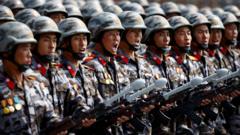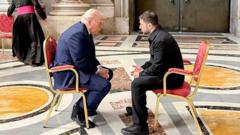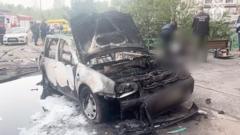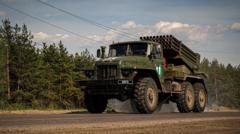The visit by Slovakia's Prime Minister Robert Fico to Moscow has presented a significant dilemma for the European Union, suggesting fractures in the bloc's unity over its stance on Russia amid the ongoing war in Ukraine. Fico's engagement with President Vladimir Putin, focused on natural gas supplies and the Ukrainian situation, mirrors previous actions by Hungary's Prime Minister Viktor Orban, who also visited Moscow earlier this year.
Slovak Prime Minister Fico's Visit to Moscow Signals Shift from EU Isolation Policy

Slovak Prime Minister Fico's Visit to Moscow Signals Shift from EU Isolation Policy
Slovak leader Robert Fico's surprise meeting with Putin raises questions about EU coherence in opposing Russia amid ongoing Ukraine conflict.
Fico, who returned to power in 2023 after shifting from a leftist background to a populist right orientation, wasted no time in reversing the more centrist government's firm support for Ukraine and critical view of Russia. During a press briefing in Moscow following their meeting, Putin's foreign policy aide, Yuri Ushakov, acclaimed Fico for his independent approach to international relations, aligning with Orban's precedent of prioritizing national interests over EU consensus.
The significance of the meeting lies not only in its implications for Slovakia-Russia relations but also in the message it sends to the broader European political landscape, where cohesion against Russian aggression is being tested. Fico's pivot towards cooperation with Russia reflects an alternative stance within the EU, raising concerns about the unity and effectiveness of the bloc's existing policies in confronting the challenges posed by Russia's actions in Ukraine.
As Europe grapples with the ramifications of the ongoing conflict, Fico's visit underscores the complexities of intra-European solidarity in the face of diverging national interests, particularly in energy-dependent nations seeking immediate solutions to pressing economic issues. The social and political ramifications of such evident discord will likely play a pivotal role in shaping future EU decisions regarding its response to both Russia and the broader geopolitical landscape.
The significance of the meeting lies not only in its implications for Slovakia-Russia relations but also in the message it sends to the broader European political landscape, where cohesion against Russian aggression is being tested. Fico's pivot towards cooperation with Russia reflects an alternative stance within the EU, raising concerns about the unity and effectiveness of the bloc's existing policies in confronting the challenges posed by Russia's actions in Ukraine.
As Europe grapples with the ramifications of the ongoing conflict, Fico's visit underscores the complexities of intra-European solidarity in the face of diverging national interests, particularly in energy-dependent nations seeking immediate solutions to pressing economic issues. The social and political ramifications of such evident discord will likely play a pivotal role in shaping future EU decisions regarding its response to both Russia and the broader geopolitical landscape.




















